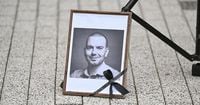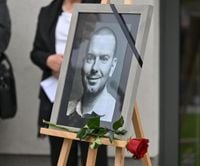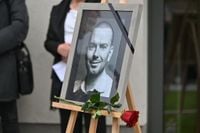The city of Krakow is mourning the loss of Dr. Tomasz Solecki, a dedicated orthopedist who was brutally murdered on April 29, 2025, during his duties at the University Hospital. His funeral, which took place today, May 7, 2025, at the Batowicki Cemetery, was marked by a state character, reflecting the profound impact of his life and work on the community.
The ceremony began at 13:40 in the chapel at ul. Powstańców, attended by family, friends, and members of the medical community, who gathered to pay their respects. Notably present was the President of Krakow, Aleksander Miszalski, who posthumously awarded Dr. Solecki the Honoris Gratia order for his exceptional contributions to the city. Additionally, President Andrzej Duda bestowed upon him the Knight's Cross of the Order of Polonia Restituta, which was presented to Solecki's family by Piotr Ćwik, the deputy head of the President's Office, recognizing his outstanding service in health protection.
The funeral was held privately, as per the family's wishes, and media were not permitted to attend. This decision underscored the family's desire for an intimate farewell amidst the public outpouring of grief and support from the community.
On the eve of the funeral, May 6, medics across Poland honored Dr. Solecki's memory with a nationwide moment of silence at noon. Sirens from ambulances echoed throughout hospitals as healthcare workers paused to reflect on the tragedy. This act of remembrance served not only as a tribute to Solecki but also as a protest against the growing violence faced by medical professionals.
In the days following the murder, a black march of silence is scheduled for May 10 in Warsaw, organized by various medical organizations including the Supreme Medical Council, the National Trade Union of Doctors, and the Resident Agreement. The organizers stated, "This march will express solidarity, mourning, and a call for respect and safety for all medical professionals." They emphasized the need to combat aggression against healthcare workers, highlighting that they stand with patients and experience the system's failures daily.
Dr. Solecki's tragic death has sparked a broader conversation about violence in healthcare settings. The 35-year-old assailant, a former patient of Solecki, reportedly believed that the doctor had caused him to develop leukemia during a prior treatment. Despite the man's delusions and refusal to accept psychiatric help, he attacked Solecki with a knife, resulting in fatal injuries.
During the funeral, a letter from Bishop Romuald Kamiński, chairman of the Polish Episcopate Conference for Health Service Ministry, was read. In it, he expressed the collective shock and sorrow felt not only within the medical community but across society. "He was a doctor by vocation, enjoying trust and recognition. A man of the highest medical and moral standards. For his stance, he paid the highest price. We thank God for his life and all the good he bestowed upon his patients and loved ones," wrote Bishop Kamiński.
The director of the University Hospital in Krakow, Marcin Jędrychowski, described Solecki as a dedicated physician who lost his life while fulfilling his duties. He called for the community to honor his memory by striving to be kinder and more compassionate, stating, "Let us not allow Tomasz's death to be in vain. Let us take inspiration from him and be better to one another. Tomasz will cheer for us from above."
As the funeral concluded, the solemnity of the occasion was amplified by the presence of a military honor guard, with banners and representatives from various institutions paying their respects. Many attendees held white roses and wreaths, symbols of remembrance and honor. The atmosphere was heavy with sorrow, yet filled with a sense of unity among those present.
The violent nature of Dr. Solecki's death has led to calls for increased security measures in medical facilities. Discussions have emerged regarding the establishment of a registry for aggressive patients to better identify and manage risks within healthcare environments. These proposals were presented to Prime Minister Donald Tusk in a recent meeting with health and justice ministers.
Dr. Solecki's life and tragic end have sparked a movement advocating for the safety of medical professionals in Poland. His dedication to his patients and the community serves as a poignant reminder of the sacrifices made by healthcare workers. As Krakow and the nation reflect on this loss, the hope is that it will lead to meaningful changes that ensure the safety and respect of those who dedicate their lives to caring for others.
In light of this tragedy, the call for compassion and understanding resonates more than ever. The community is urged to come together, not only to honor Dr. Solecki's memory but to foster a culture of respect and safety for all individuals in the healthcare profession.






